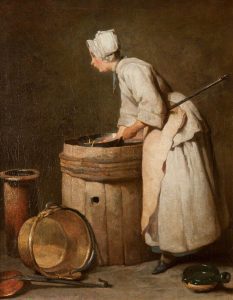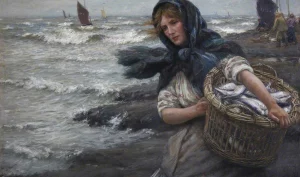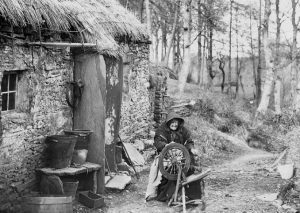Hello my wonderful readers,
I read a lot of books where the protagonists are of high society. While the ‘professions’ of Laird, Duke, King, etc. are all nice and well, I was wondering, what did the simple people do? The ‘peasants’ as they were called?
The professions varied, both in the amount of money you could earn, as well as the amount of respect one got from doing the certain profession. Let’s find out more about them, shall we?


A domestic servant
A domestic servant was one, of course, we would call today ‘live in maid’. Domestic service was the single biggest employer for women, and only second to men! Butlers and grooms tended to be male workers, but cleaners, maids and cooks tended to be women. Castle kitchens bustled as cooks and servants prepared food for the lord’s or lady’s table. Boys brought wood from the stores to keep the cooking fires lit. Grooms tended the horses while stable lads mucked out the stables, laid fresh hay and fetched and carried water and feed. Huntsmen brought back deer, hares, rabbits and birds for the table. The ladies of the castle were served by ladies-in-waiting, the so-called maids.
Domestic servants were not paid much – that’s true and well. However, they had a guaranteed roof over their heads, and food to fill their bellies. The bare necessities, but a lot of time it was more than other workers had in the Middle Ages. Do you think you would be able to do this? Work all day, every day, with the odd Sunday off? I don’t know if I could!
Crofters, farmers
What is crofting, really? Well, it’s a form of land-tenure. Sometimes they would also produce a small amount of food from these lands, but they were not exactly farmers. It was mostly found in Scottish Highlands and the Islands. Crofting was often hard work, and was only part of the crofter’s working life – often they had another job in their communities.
Did you know? There are still working crofts in Scotland! A small amount indeed (around 20,000), but nothing has changed. Crofters still either work a second job, or are already retired!
Farmers in Scotland were almost like everywhere else: before the agricultural revolution, most families kept their own animals and grew enough food to feed themselves. However, Scotland has helped a lot with the revolutionizing of farming, since they helped with developments such as drainage and plough improvements. These things, though, destroyed many people’s lives. Due to the shortage in jobs, many people moved to the industrial towns and even overseas in search of work.
The world has not changed so much the past few eons, huh?!


Fisherman’s Reel. Image source.
Fisherfolk and shipbuilders
Of course, Scotland is surrounded by water all over. Fishing has been one of the biggest industries in Scotland for many years! Since, they are a mixture of Vikings and Irish, it’s only natural that the Scots would love the sea as well.
The North Sea has a great variety of fish to offer supporting everything from crab fishing to herring and deep-sea fishing. As well as fishing out on the boats, the industry created lots of jobs back on land with the family of fisherfolk working to gut, preserve, bait lines and repair nets. People even tended to relocate to the ports during fishing season, to get more jobs and be closer to where the money was made hahah!
Since they went fishing, they would need ships, right? Originally shipbuilders were known as shipwrights and their skills were in woodworking. Unfortunately, workers were low paid and often didn’t have permanent jobs, only working when a contract was secured for a particular ship. But Scotland added some great contributions to the Industrial Revolution with their building of steel-hulled ships.


Celtic Women and Spinning Wheels. Image source.
Weavers and Spinners
Spinning was a very well-known profession of the past, and could be found all around the world. It’s when fibres are drawn out and twisted together to make a continuous thread for weaving. In Scotland, spinning was the work of unmarried daughters, living in poor households. (The term ‘spinster’ comes from there!)
However, later on, big spinning mills were built, and the production moved there. Wages were low and women, as well as young children, had to work around 60 hours a week!
Weavers, on the other hand, used the threads created by spinners to make a variety of fabrics and materials. They also tended to work from home, until the Industrial Revolution. Their products included: quality tweeds in the Borders, cottons in the west, damask in Dunfermline, patterned shawls in Paisley and jute in Dundee.
Did you know? Tartan became a prominent and popular feature in the whole of the United Kingdom after a famous visit of George IV to Edinburgh in 1822.
Also, a small gossip: it was said that spinners and weavers didn’t see eye to eye, since weavers thought they were superior. Whew! Imagine the fights in the Middle Ages!
Which profession would you like to do, my dear?
Let me know in the comments!
Until next time…
Written by Eloise Madig



